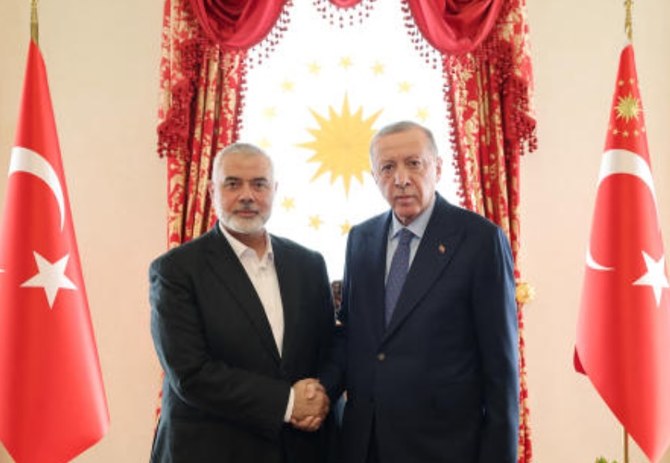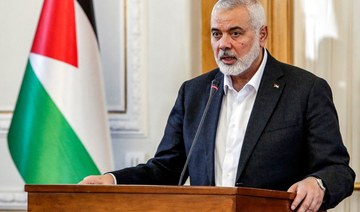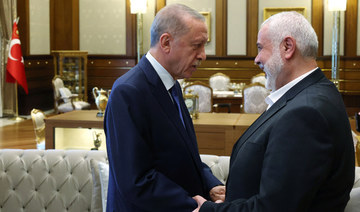ANKARA: The meeting between Turkish President Recep Tayyip Erdogan and Hamas leader Ismail Haniyeh in Istanbul on Saturday has sparked debate over Turkiye’s attempts to play a greater mediating role for the Palestinian cause amid domestic controversies over the ruling government, which has lost support among its conservative electoral base since local elections last month.
Haniyeh’s visit is his first meeting with Erdogan in Turkiye since the start of the Israeli-Hamas conflict in Gaza.
For Wolfango Piccoli, co-president of Teneo Intelligence in London, the meeting is part of Erdogan’s attempts to reposition himself as a credible defender of the Palestinian cause after his recent electoral defeat.
“Hosting the Hamas leader is likely to reinforce the impression in the West that Turkiye is at best a transactional partner, not an ally,” he said.
Turkiye does not consider Hamas a terrorist organization, unlike Washington and Brussels. The country has also strongly criticized Israel’s military operation in Gaza, which Erdogan previously described as genocide. Hamas also established a presence in Istanbul in 2011, although not on par with its political office in Doha.
Ankara has also been a major humanitarian donor to Gaza, alongside several Gulf states, and has actively helped several Palestinians from Gaza receive medical treatment in Turkish hospitals.
“I will continue to defend the Palestinian struggle and be the voice of the oppressed Palestinian people as long as Allah gives me life, even if I am left alone,” Erdogan said in his speech to parliament last Wednesday.
The Turkish president has always been on friendly terms with Haniyeh.
In a recent phone call to the Hamas leader, Erdogan offered his condolences after three of his sons were killed in an Israeli air strike in Gaza.
“Israel will definitely be held accountable before the law for the crimes against humanity it has committed,” Erdogan told Haniyeh, according to an AFP report.
For Betul Dogan Akkas, assistant professor of international relations at the department of international relations at Ankara University, given the current fragile situation in Gaza, there is a significant need for the mediation efforts by Qatar and Turkiye.
“With Haniyeh and other officials based in Qatar, there is now a more effective political bureau compared to the past. The current military balance in Gaza is very critical; they are cornered in Rafah. On the other hand, Hamas needs to build a more strategic power,” she told Arab News.
Akkas thinks that if this Saturday’s visit of Haniyeh contributes to further collaboration between Turkiye and Hamas to address that strategic power deficiency, it would be meaningful.
“Haniyeh could take on a more effective role due to Gaza’s current situation because they need a way out,” she added.
Domestically, however, Erdogan’s Justice and Development Party, known as the AKP, has come under heavy criticism for its flourishing and uninterrupted trade with Israel, even during its military offensive in Gaza.
The AKP’s Islamist rival, the New Welfare Party or YRP, played this trade card during the local elections on March 31, highlighting Erdogan’s failure to halt economic ties with Israel despite his harsh rhetoric against the Jewish state.
The YRP accused the government of applying double standards by strongly criticizing Israel while continuing trade relations. After the elections, the YRP won some local administrations previously held by the AKP.
Turkiye’s exports to Israel exceeded $5.4 billion in 2023, accounting for 2.1 percent of its total exports, according to official data.
Following nationwide criticism, the Turkish Trade Ministry recently imposed restrictions on some 54 categories of exports to Israel, including cement, steel, machinery, construction materials, chemical compounds, and several metal products, and these restrictions are expected to remain in place until Israel declares a ceasefire in Gaza.
On April 16, Erdogan compared Hamas to Turkish independence fighters who resisted foreign occupiers during the liberation of the country and the establishment of the modern Turkish Republic in 1923.
His comments were seen as one of the most blatant endorsements by the Turkish leader since the start of the war in October.
According to Piccoli, while such words may play well with domestic audiences, they are unlikely to be welcomed in Western capitals, including Washington.
Erdogan will make his first official visit to the US since the election of President Joe Biden in 2020 on 9 May. The Palestinian cause is expected to feature in the talks.
Piccoli believes that Haniyeh’s visit is unlikely to lead to any concrete Turkish action against Israel.
“The economic restrictions and Haniyeh’s visit reflect Turkiye’s desire to ensure that the Gaza conflict is not overshadowed by tensions between Israel and Iran, including the Iranian attacks of April 13-14 and the Israeli strikes on Isfahan in the early hours of April 19,” he said.
Earlier this week, Erdogan blamed Prime Minister Benjamin Netanyahu for Iran’s unprecedented attack on Israel, Piccoli added.
On the other hand, how Turkiye will be able to mediate between Palestinian and Israeli negotiators is raising concerns, especially after Erdogan’s harsh criticism of Israel’s military actions in Gaza.
The fate of the hostages held by Hamas since Oct. 7 will also be a source of concern for such mediation efforts.
Turkish Foreign Minister Hakan Fidan visited Qatar April 16-17 and met with Haniyeh and Qatari Prime Minister Sheikh Mohammed bin Abdulrahman Al -Thani.
Turkiye was to host intense diplomatic negotiations on Saturday as Egyptian Foreign Minister Sameh Shoukry was also expected to travel to the country to discuss the situation in Gaza with Fidan.
For Piccoli, while the recent negotiations may go some way to assuaging domestic public anger, the Erdogan government’s outreach to Hamas is likely to reinforce the impression in the US and the EU that Turkiye is no longer aligned with the West and is now — at best — a potential partner rather than an ally.
For the moment, Erdogan has been cautious about commenting on his meeting with Haniyeh.
“We will keep the agenda between us and Mr.Haniyeh,” he said when questioned by journalists on Friday.
Erdogan in mediation talks with Hamas leader amid domestic controversies
https://arab.news/jmh7y
Erdogan in mediation talks with Hamas leader amid domestic controversies

- The meeting ‘is part of president’s attempts to reposition himself as credible defender of Palestinian cause,’ analyst tells Arab News
- Turkiye does not consider Hamas a terrorist organization, unlike Washington and Brussels
UAE food aid shipment arrives in Gaza

- Shipment arrived via the maritime corridor from Larnaca in Cyprus
DUBAI: A UAE aid shipment carrying 252 tons of food arrived in Gaza bound for the north of the enclave, Emirates News Agency reported on Sunday.
The shipment arrived via the maritime corridor from Larnaca in Cyprus. The delivery involved cooperation from the US, Cyprus, UK, EU and UN.
The supplies were unloaded at UN warehouses in Deir Al-Balah and are awaiting distribution to Palestinians in need.
Emirati Minister of State for International Cooperation Reem Al-Hashimy said that the food supplies will be delivered and distributed in collaboration with international partners and humanitarian organizations, as part of the UAE’s efforts to provide relief and address the humanitarian crisis in the Gaza Strip.
The UAE, in accordance with its historical commitment to the Palestinian people and under the guidance of its leadership, continues to provide urgent humanitarian aid and supplies to Gaza, she added.
Since the war began in October, the UAE has delivered more than 32,000 tons of urgent humanitarian supplies, including food, relief and medical supplies, via 260 flights, 49 airdrops and 1,243 trucks.
The UAE delivery came as Israel closed the Rafah border crossing. The World Health Organization said on Friday that it has received no medical supplies in the Gaza Strip for 10 days.
Helicopter carrying Iran's President Raisi makes rough landing, Iranian media say

- IRNA said the helicopter in question had been carrying Raisi, Foreign Minister Hossein Amirabdollahian and local officials
DUBAI: A helicopter carrying Iranian President Ebrahim Raisi and his foreign minister made a rough landing on Sunday as it was crossing a mountainous area in heavy fog on the way back from a visit to Azerbaijan, Iranian news agencies said.
The bad weather was complicating rescue efforts, the state news agency IRNA reported. The semi-official Fars news agency urged Iranians to pray for Raisi and state TV carried prayers for his safety.
IRNA said the helicopter in question had been carrying Raisi, Foreign Minister Hossein Amirabdollahian and local officials.
Interior Minister Ahmed Vahidi told state TV only that one of the helicopters in a group of three had come down hard, and that authorities were awaiting further details.
Raisi, 63, was elected president at the second attempt in 2021, and since taking office has ordered a tightening of morality laws, overseen a bloody crackdown on anti-government protests and pushed hard in nuclear talks with world powers.
In Iran’s dual political system, split between the clerical establishment and the government, it is the supreme leader rather than the president who has the final say on all major policies.
But many see Raisi as a strong contender to succeed his mentor, Supreme Leader Ayatollah Ali Khamenei, who has strongly endorsed Raisi's main policies.
Israel war cabinet minister says to quit unless Gaza plan approved

- Israeli PM Benjamin Netanyahu dismisses comments as "washed-up words"
- Broad splits emerge in Israeli war cabinet as Hamas regroups in northern Gaza
JERUSALEM: Israeli war cabinet minister Benny Gantz said Saturday he would resign from the body unless Prime Minister Benjamin Netanyahu approved a post-war plan for the Gaza Strip.
“The war cabinet must formulate and approve by June 8 an action plan that will lead to the realization of six strategic goals of national importance.. (or) we will be forced to resign from the government,” Gantz said, referring to his party, in a televised address directed at Netanyahu.
Gantz said the six goals included toppling Hamas, ensuring Israeli security control over the Palestinian territory and returning Israeli hostages.
“Along with maintaining Israeli security control, establish an American, European, Arab and Palestinian administration that will manage civilian affairs in the Gaza Strip and lay the foundation for a future alternative that is not Hamas or (Mahmud) Abbas,” he said, referring to the president of the Palestinian Authority.
He also urged the normalization of ties with Saudi Arabia “as part of an overall move that will create an alliance with the free world and the Arab world against Iran and its affiliates.”
Netanyahu responded to Gantz’s threat on Saturday by slamming the minister’s demands as “washed-up words whose meaning is clear: the end of the war and a defeat for Israel, the abandoning of most of the hostages, leaving Hamas intact and the establishment of a Palestinian state.”
The Israeli army has been battling Hamas militants across the Gaza Strip for more than seven months.
But broad splits have emerged in the Israeli war cabinet in recent days after Hamas fighters regrouped in northern Gaza, an area where Israel previously said the group had been neutralized.
Netanyahu came under personal attack from Defense Minister Yoav Gallant on Wednesday for failing to rule out an Israeli government in Gaza after the war.
The Gaza war broke out after Hamas’s attack on October 7 on southern Israel which resulted in the deaths of more than 1,170 people, mostly civilians, according to an AFP tally of Israeli official figures.
The militants also seized about 250 hostages, 124 of whom Israel estimates remain in Gaza, including 37 the military says are dead.
Israel’s military retaliation against Hamas has killed at least 35,386 people, mostly civilians, according to the Hamas-run Gaza’s health ministry, and an Israeli siege has brought dire food shortages and the threat of famine.
US, Iranian officials met in Oman after Israel escalation

- Washington called on Tehran to rein in proxy forces
- Officials sat in separate rooms with Omani intermediaries passing messages
LONDON: US and Iranian officials held talks in Oman last week aimed at reducing regional tensions, the New York Times reported.
Through intermediaries from Oman, Washington’s top Middle East official Brett McGurk and the deputy special envoy for Iran, Abram Paley, spoke with Iranian counterparts.
It was the first contact between the two countries in the wake of Iran’s retaliatory missile and drone attack on Israel in April.
The US officials, who communicated with their Iranian counterparts in a separate room — with Omani officials passing on messages — requested that Tehran rein in its proxy forces across the region.
The US has had no diplomatic contact with Iran since 1979, and communicates with the country using intermediaries and back channels.
Since the outbreak of the Gaza war last October, Iran-backed militias — including Hezbollah in Lebanon, the Houthis in Yemen, and armed groups in Syria and Iraq — have ramped up attacks on Israeli and American targets.
But US officials have determined that neither Hezbollah nor Iran want an escalation and wider war.
After Israel struck Iran’s consulate in Damascus at the beginning of April, Tehran retaliated with hundreds of ballistic missiles and drones.
The attack — which was intercepted by air defense systems from Israel, the US and the UK, among others — was the first ever direct Iranian strike on Israel, which has for years targeted Iranian assets in Syria, whose government is a close ally of Tehran.
National Security Adviser Jake Sullivan said in a news conference this week that the “Iranian threat” to Israel and US interests “is clear.”
He added: “We are working with Israel and other partners to protect against these threats and to prevent escalation into an all-out regional war through a calibrated combination of diplomacy, deterrence, force posture adjustments and use of force when necessary to protect our people and to defend our interests and our allies.”
Death toll from Israeli strike on Nuseirat rises to 31: Gaza officials

- Rescue workers continuing to search for missing people under the rubble
- Heavy Israeli bombardments have been reported in the central Nuseirat camp
GAZA STRIP, Palestinian Territories: Gaza’s civil defense agency said Sunday that an Israeli air strike targeting a house at a refugee camp in the center of the Palestinian territory killed at least 31 people, updating an earlier toll.
“The civil defense crew were able to recover 31 martyrs and 20 wounded from a house belonging to the Hassan family, which was targeted by the Israeli occupation forces in the Nuseirat camp,” Gaza civil defense agency spokesman Mahmud Bassal told journalists.
He said rescue workers were continuing to search for missing people under the rubble.
Earlier on Sunday the Al-Aqsa Martyrs Hospital had said it had received the bodies of 20 people killed in the strike which witnesses said occurred around 3:00 am local time.
The Israeli army when contacted by AFP asked for specific coordinates of the strike.
Palestinian official news agency Wafa reported that the wounded included several children.
Fierce battles and heavy Israeli bombardments have been reported in the central Nuseirat camp since the military launched a ground operation on the southern city of Rafah in early May.
Palestinian militants and Israeli troops have also clashed in north Gaza’s Jabalia camp for days now.
Witnesses said several other houses were targeted in air strikes during the night across Gaza, and that strikes and artillery shelling also hit parts of Rafah during the night.
The Israeli military said two more soldiers were killed in Gaza the previous day.
The military said 282 soldiers have been killed so far in the Gaza military campaign since the start of the ground offensive on October 27.


















